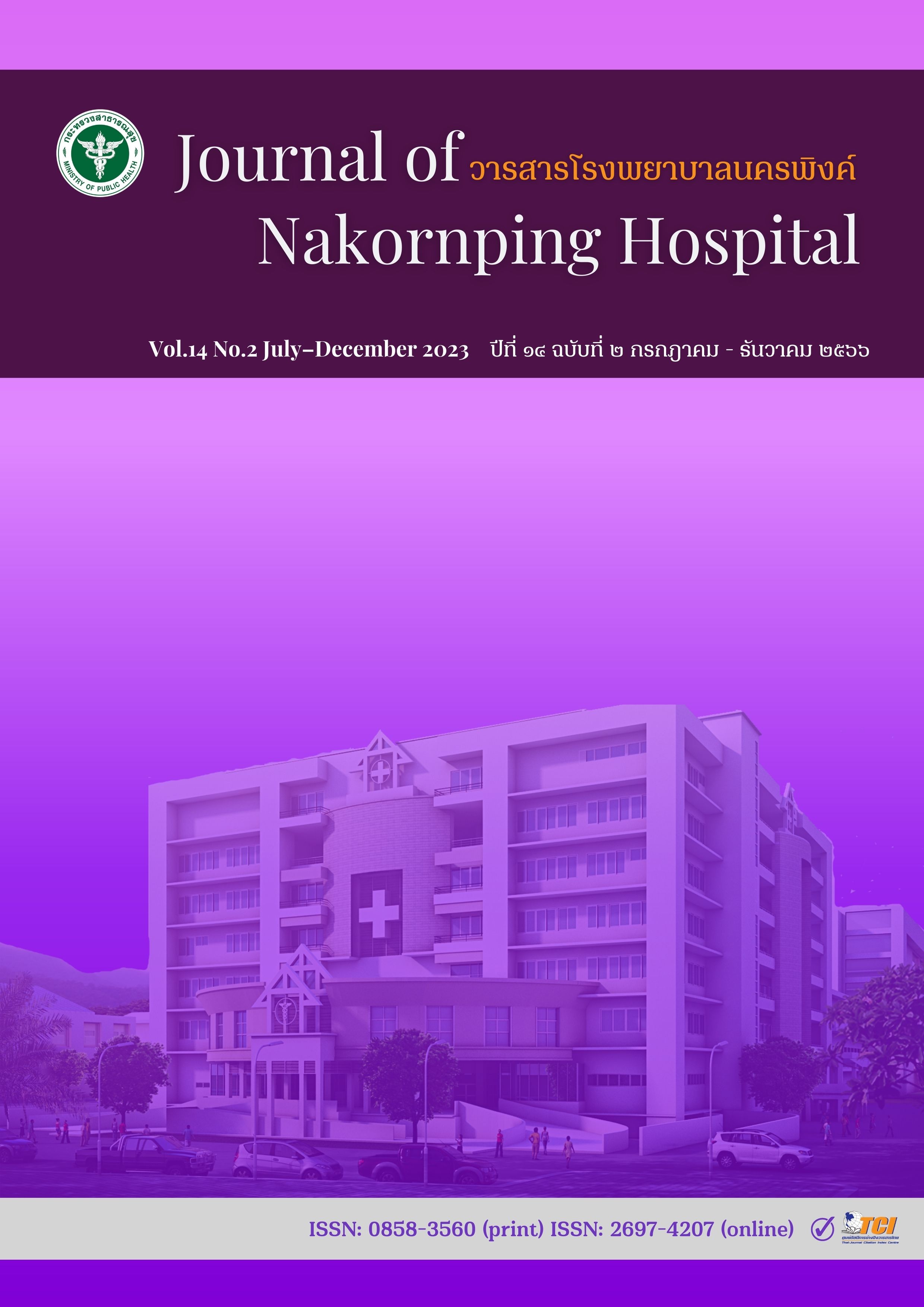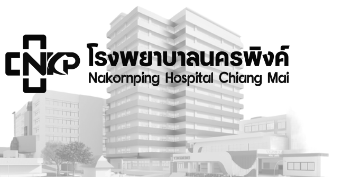ผลของโปรแกรมการดูแลภาวะโภชนาการในผู้ป่วยโรคไตเรื้อรังระยะสุดท้ายที่ได้รับการฟอกเลือดด้วยเครื่องไตเทียม หน่วยไตเทียม โรงพยาบาลมหาสารคาม
คำสำคัญ:
ผู้ป่วยโรคไตเรื้อรังระยะสุดท้าย, การฟอกเลือดด้วยเครื่องไตเทียม, ภาวะโภชนาการ, NAF, nPCR, albuminบทคัดย่อ
ความเป็นมา: ผู้ป่วยโรคไตเรื้อรังระยะสุดท้าย ที่ได้รับการฟอกเลือดด้วยเครื่องไตเทียม ร่างกายมีการสลายโปรตีน และสูญเสียกรดอะมิโน เกลือแร่ และวิตามินต่าง ๆ ไปกับน้ำยาฟอกเลือดส่งผลให้ผู้ป่วยเสี่ยงต่อการเกิดภาวะทุพโภชนาการ ซึ่งภาวะนี้มีความสัมพันธ์กับอัตราการเจ็บป่วย คุณภาพชีวิต และอัตราการตายของผู้ป่วย
วัตถุประสงค์: เพื่อศึกษาผลของโปรแกรมการดูแลภาวะโภชนาการในผู้ป่วยโรคไตเรื้อรังระยะสุดท้ายที่ได้รับการฟอกเลือดด้วยเครื่องไตเทียม หน่วยไตเทียม โรงพยาบาลมหาสารคาม
วิธีดำเนินการวิจัย: การวิจัยกึ่งทดลอง (quasi-experimental research) แบบหนึ่งกลุ่มวัดก่อนและหลังการทดลอง (one-group pretest-posttest design) ระหว่าง6 กุมภาพันธ์ - 8 พฤษภาคม 2566 ในผู้ป่วยโรคไตเรื้อรังระยะสุดท้ายที่ได้รับการฟอกเลือดด้วยเครื่องไตเทียมที่ฟอกเลือดประจำ ในหน่วยไตเทียม โรงพยาบาลมหาสารคาม จำนวน 44 คน โดยได้รับการดูแลตามโปรแกรมการดูแลภาวะโภชนาการที่ผู้วิจัยสร้างขึ้น ระยะเวลาในการเข้าร่วมโครงการ 12 สัปดาห์ วิเคราะห์ข้อมูลด้วยโปรแกรมสำเร็จรูป ใช้สถิติเชิงพรรณนาในการแจกแจงความถี่ ร้อยละ ค่าเฉลี่ย และส่วนเบี่ยงเบนมาตรฐาน เปรียบเทียบผลของโปรแกรมการดูแลภาวะโภชนาการ ก่อนและหลังได้รับโปรแกรมการจัดการตนเองโดยใช้สถิติ t-test
ผลการวิจัย: กลุ่มตัวอย่างทั้งหมด 44 คน เพศชายร้อยละ 59 เพศหญิงร้อยละ 41 อายุเฉลี่ย 63.52 ± 12.12 ปี ระยะเวลาฟอกเลือดด้วยเครื่องไตเทียมเฉลี่ย 4.64 ± 4.71 ปี มีค่าคะแนนโภชนาการ NAF เฉลี่ย 6.36 ± 2.63 หลังการเข้าร่วมโปรแกรมการดูแลภาวะโภชนาการ มีผลของคะแนนความรู้ การรับรู้ความสามารถในการดูแลตนเองด้านภาวะโภชนาการสูงขึ้น ผลการประเมินภาวะโภชนาการ พบว่าค่าเฉลี่ยของ nPCR และ albumin เพิ่มขึ้นจาก 1.12 ± 0.34 กรัม/กก./วัน, 3.74 ± 0.37 มก./ดล. เป็น 1.27 ± 0.26กรัม/กก./วัน, 3.89 ± 0.25มก./ดล., p=0.001, p<0.001 แต่ค่าเฉลี่ยของ Dry weight, BMI, serum potassium, serum phosphorus และ serum calcium ก่อนและหลังได้รับโปรแกรมการดูแลภาวะโภชนาการ ไม่มีความแตกต่างกันอย่างมีนัยสำคัญทางสถิติ แต่มีแนวโน้มที่ดีขึ้น
สรุป: โปรแกรมการดูแลภาวะโภชนาการในการศึกษานี้มีความเหมาะสมที่จะนำไปใช้ในการดูแลผู้ป่วยโรคไตเรื้อรังระยะสุดท้ายที่ได้รับการฟอกเลือดด้วยเครื่องไตเทียม ผู้ป่วยมีความรู้ การรับรู้ความสามารถในการดูแลตนเองทางด้านโภชนาการดีขึ้น ควรนำไปใช้ประเมินผู้ป่วยอย่างต่อเนื่อง
เอกสารอ้างอิง
Kidney Disease Improving Global Outcomes (KDIGO). KDIGO 2012 Clinical Practice Guideline for the Evaluation and Management of Chronic Kidney Disease. Kidney International Supplement. 2013;3(1):1–150.
Puengchompoo W. Situation of palliative care in thai elderly patients with end stage renal disease. Nursing Journal. 2014;41(4):166-77. [In Thai]
Jiwakanon S, Warodomwichit D, Supasyndh O, Chattranukulchai P, Pisprasert V, Nongnuch A, et al. Clinical practice recommendation for nutritional management in adult kidney patients 2018. Thai JPEN. 2020;28(2):18-67. [In Thai]
Chuasuwan A, Lumpaopong A, editors. THAILAND RENAL REPLACEMENT THERAPY YEAR 2016-2019 [Internet]. bangkok: The Nephrology Society of Thailand; 2016-2019. Available from: https://www.nephrothai.org/wp-content/uploads/2021/01/1.TRT-Annual-report-2016-2019.pdf [In thai]
Salame C, Eaton S, Grimble G, Davenport A. Protein Losses and Urea Nitrogen Underestimate Total Nitrogen Losses in Peritoneal Dialysis and Hemodialysis Patients. J Ren Nutr. 2018;28(5):317-23. doi: 10.1053/j.jrn.2018.01.016.
Pungchompoo W. Nursing care of persons with chronic kidney disease receiving hemodialysis. 2nd ed. Chiang Mai: Chiang Mai University Press; 2016. [In Thai]
Ikizler TA, Cano NJ, Franch H, Fouque D, Himmelfarb J, Kalantar-Zadeh K, et al. Prevention and treatment of protein energy wasting in chronic kidney disease patients: a consensus statement by the International Society of Renal Nutrition and Metabolism. Kidney Int. 2013;84(6):1096-107. doi: 10.1038/ki.2013.147.
Kittiskulnam P. Nutrition in kidney patients. Bangkok: Tex and Journal Publication; 2017. [In Thai]
Johansen KL, Dalrymple LS, Delgado C, Kaysen GA, Kornak J, Grimes B, et al. Association between body composition and frailty among prevalent hemodialysis patients: a US Renal Data System special study. 2014;25(2):381-9. doi: 10.1681/ASN.2013040431.
Rattanaruang R, Prapaipanich W, Visudtibhan PJ. Effects of a food intake focused on protein promoting program in End-Stage Renal Disease Patients Undergoing Hemodialysis. Ramathibodi Nursing Journal. 2014;20(3):341-55. [In Thai]
Hemodialysis department Mahasarakham Hospital. Service Profile 2022. In; Nursing Service Quality Report 2022. Quality Development Mahasarakham Hospital: Mahasarakham Hospital; 2022. [In Thai]
Narkvijitr S, Nagaviroj K, Ocharoen P, Mingwong S. Nutritional status and associated factors of food consumption among patients in palliative care clinic. Journal of Professional Routine to Research. 2016;3(Aug):41-53. [In Thai]
Lukowsky LR, Kheifets L, Arah OA, Nissenson AR, Kalantar-Zadeh K. Nutritional predictors of early mortality in incident hemodialysis patients. Int Urol Nephrol. 2014;46(1):129-40. doi: 10.1007/s11255-013-0459-2.
Chinnoros S, Khueankham P, Sitthapirom V. Correlation between malnutrition and quality of life of hemodialysis patients. Royal Thai Army Medical Journal. 2022;75(1):3-13. [In Thai]
Nagy E, Mahmoud M, El-Kannishy G, Sayed-Ahmed N. Impact of malnutrition on health-related quality of life in patients on maintenance hemodialysis. Ther Apher Dial. 2021;25(4):467-74. doi: 10.1111/1744-9987.13588.
Peanprasit J, Phornphibul P, Soivong P. The effect of promoting a nutritional self-management program on persons receiving hemodialysis. Nursing Journal CMU. 2022;49(4):128-39. [In Thai]
Rungprai T, Choowattanapakorn T. The Effect of an Individual and Family Self-Management Program on Volume Overload in Older Persons with Chronic Kidney Disease Undergoing Hemodialysis. Journal of Nursing Science Chulalongkorn University. 2018;30(1):96-107. [In Thai]
Mungvongsa A, Chaosuan D, Patphai T, Dangsang B, Khosantikul W, Intrapong S. Effects of Dietary Behavior Modification of Self-Efficacy Theory for Improving Well- Health in Patients with Diabetes and Hypertension among, Na Phan Sam Tambon Health Promoting Hospital, Phetchaburi Province. Mahasarakham hospital journal. 2021;18(3):161-71. [In Thai]
Bandura A. Self-efficacy: toward a unifying theory of behavioral change. Psychol Rev. 1977;84(2):191-215. doi: 10.1037//0033-295x.84.2.191.
Chittawatanarat K, Tosanguan K, Chaikledkaew U, Komin S, Trakulhoon W. Screening and assessment of patients with or at risk of hospital malnutrition [Internet]. Nonthaburi: Health Intervention and Technology Assessment Program (HITP); 2016. Available from: https://www.hitap.net/wp-content/uploads/2014/09/okhrngraangwicchaythuphophchnaakaar.pdf [In Thai]
Bunphon Y, Phatsuk P, Tongkaew P. Development and Validation of Food and Nutrition Knowledge Assessment Form for CKD Patients and Caregivers in Maharaj Nakhon Si Thammarat Hospital. Journal of Nutrition Association of Thailand. 2020;55(1):1-16. [In Thai]
Paypat S, Pakdevong N, Binhosen V. The Association among Knowledge, Self-Efficacy and Self-Management Behaviors in Patients with Chronic Kidney Disease. APHEIT Journal of Nursing and Health. 2021;3(2):22–36. [In Thai]
Lingerfelt KL, Thornton K. An educational project for patients on hemodialysis to promote self-management behaviors of end stage renal disease education. Nephrol Nurs J. 2011;38(6):483-8.
Wungrath J, Rerkkasem K, Saengyo S, Pongtam S, Pinmars N, Chanwikrai Y. Nutrient Intake Characteristics of End Stage Renal Disease with Hemodialysis Patients at Maharaj Nakorn Chiang Mai Hospital. Journal of Community Development and Life Quality. 2019;7(1):81-92. [In Thai]
Zrinyi M, Juhasz M, Balla J, Katona E, Ben T, Kakuk G, et al. Dietary self-efficacy: determinant of compliance behaviours and biochemical outcomes in haemodialysis patients. Nephrol Dial Transplant. 2003;18(9):1869-73. doi: 10.1093/ndt/gfg307.
Jintana P, Sriyuktasuth A, Pongthavornkamol K, Nata N. Information-Motivation-Behavioral Skills Program Improved Phosphate Binder Adherence in Patients with Chronic Hemodialysis. Journal of Nursing Science. 2016;34(2):92-101. [In Thai]
Oka M, Chaboyer W. Influence of self-efficacy and other factors on dietary behaviours in Japanese haemodialysis patients. Int J Nurs Pract. 2001;7(6):431-9. doi: 10.1046/j.1440-172x.2001.00334.x.
Karavetian M, de Vries N, Rizk R, Elzein H. Dietary educational interventions for management of hyperphosphatemia in hemodialysis patients: a systematic review and meta-analysis. Nutr Rev. 2014;72(7):471-82. doi: 10.1111/nure.12115.
ดาวน์โหลด
เผยแพร่แล้ว
รูปแบบการอ้างอิง
ฉบับ
ประเภทบทความ
สัญญาอนุญาต
ลิขสิทธิ์ (c) 2023 โรงพยาบาลนครพิงค์

อนุญาตภายใต้เงื่อนไข Creative Commons Attribution-NonCommercial-NoDerivatives 4.0 International License.
บทความที่ได้รับการตีพิมพ์เป็นลิขสิทธิ์ของโรงพยาบาลนครพิงค์ จ.เชียงใหม่
ข้อความที่ปรากฏในบทความแต่ละเรื่องบทความในวารสารวิชาการและวิจัยเล่มนี้เป็นความคิดเห็นส่วนตัวของผู้เขียนแต่ละท่านไม่เกี่ยวข้องกับโรงพยาบาลนครพิงค์ และบุคลากรท่านอื่นๆในโรงพยาบาลฯ ความรับผิดชอบเกี่ยวกับบทความแต่ละเรื่องผู้เขียนจะรับผิดชอบของตนเองแต่ละท่าน



